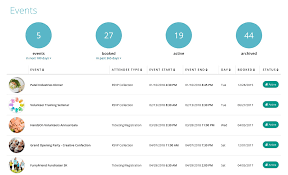The Cost of Virtual Event Platforms
Virtual events have become increasingly popular in recent years, offering a convenient and cost-effective way to host conferences, trade shows, and other gatherings online. One crucial factor to consider when planning a virtual event is the cost of the platform you choose to use.
Virtual event platforms come in various price ranges, depending on the features and services they offer. Some platforms may offer basic functionalities for free, while others may charge a subscription fee or a one-time payment for access to advanced features.
Factors that can influence the cost of a virtual event platform include:
- Number of attendees: Some platforms charge based on the number of attendees at your event.
- Features and customization: Platforms with more advanced features and customization options may come at a higher price.
- Integration capabilities: If you need your virtual event platform to integrate with other tools or software, this could affect the overall cost.
- Support and training: Platforms that offer dedicated support or training services may charge extra for these services.
It’s essential to carefully evaluate your needs and budget when selecting a virtual event platform. Consider factors such as the size of your event, desired features, and available resources before making a decision.
Ultimately, investing in the right virtual event platform can help you create a successful and engaging online experience for your audience. Compare different platforms, their costs, and features to find the best fit for your virtual event needs.
9 Strategic Tips for Navigating Virtual Event Platform Costs and Maximizing Your Budget
- Compare subscription models versus one-time event pricing to determine which is more cost-effective based on the frequency of your events.
- Check for hidden costs such as setup fees, additional service charges, or overage fees for exceeding participant limits.
- Negotiate with providers for discounts or package deals if you plan to host multiple events or require long-term services.
- Consider platforms that offer scalable pricing so you only pay for the number of attendees or features you actually need.
- Look for platforms that provide a free trial period to test their services before committing to a purchase.
- Evaluate the cost versus benefit of premium features like advanced analytics, custom branding, and networking capabilities to ensure they justify the expense.
- Utilize early-bird specials or promotional codes often offered by virtual event platforms during initial sign-up or special occasions.
- Inquire about non-profit discounts or special rates for educational institutions if applicable to your organization type.
- Ensure that the platform’s technical support and customer service are included in the base price to avoid unexpected costs post-purchase.
Compare subscription models versus one-time event pricing to determine which is more cost-effective based on the frequency of your events.
When considering the cost of virtual event platforms, it is essential to compare subscription models with one-time event pricing to determine the most cost-effective option based on the frequency of your events. If you host events regularly throughout the year, a subscription model might offer better value machinery. In contrast, if you only host occasional events, opting for one-time event pricing could be more economical in the long run. By analyzing your event schedule and budget constraints, you can make an informed decision on which pricing model aligns best with your specific needs and usage patterns.
Check for hidden costs such as setup fees, additional service charges, or overage fees for exceeding participant limits.
When considering the cost of a virtual event platform, it is crucial to be vigilant and check for hidden expenses that could impact your budget. Hidden costs such as setup fees, additional service charges, or overage fees for exceeding participant limits can quickly add up and affect the overall affordability of the platform. By carefully reviewing the pricing structure and terms of service, you can avoid unexpected expenses and ensure that you select a virtual event platform that aligns with your financial constraints.
Negotiate with providers for discounts or package deals if you plan to host multiple events or require long-term services.
When considering the cost of virtual event platforms, it is advisable to negotiate with providers for discounts or package deals, especially if you plan to host multiple events or require long-term services. By discussing your needs and potential long-term partnership with the platform provider, you may be able to secure a more cost-effective solution that aligns with your budget and offers added value for your ongoing virtual event hosting needs.
Consider platforms that offer scalable pricing so you only pay for the number of attendees or features you actually need.
When exploring virtual event platform costs, it’s advisable to prioritize platforms that provide scalable pricing options. Opting for platforms that offer scalable pricing ensures that you only pay for the specific number of attendees or features essential to your event. This cost-effective approach allows you to tailor your expenses based on your requirements, ultimately maximizing the value you receive from the virtual event platform.
Look for platforms that provide a free trial period to test their services before committing to a purchase.
When exploring virtual event platform costs, it is advisable to seek out providers that offer a free trial period. This allows you to experience the platform’s features and functionalities firsthand before making a financial commitment. By taking advantage of a free trial, you can assess whether the platform meets your event requirements and offers the necessary tools for a successful virtual gathering. Testing the services during a trial period can help you make an informed decision and ensure that you invest in a platform that aligns with your specific needs.
Evaluate the cost versus benefit of premium features like advanced analytics, custom branding, and networking capabilities to ensure they justify the expense.
When considering the cost of a virtual event platform, it is crucial to evaluate the value of premium features such as advanced analytics, custom branding, and networking capabilities. These features can enhance the overall experience for both organizers and attendees, but it’s essential to assess whether their benefits justify the additional expense. Advanced analytics can provide valuable insights into attendee engagement and behavior, custom branding can help reinforce your brand identity, and networking capabilities can facilitate meaningful connections among participants. By carefully weighing the cost versus benefit of these premium features, you can make an informed decision that aligns with your event goals and budget constraints.
Utilize early-bird specials or promotional codes often offered by virtual event platforms during initial sign-up or special occasions.
To optimize your budget when selecting a virtual event platform, take advantage of early-bird specials or promotional codes frequently provided by platforms during the initial sign-up process or on special occasions. These offers can help you access premium features at a discounted rate, making it a cost-effective way to enhance your virtual event experience. By keeping an eye out for these promotions and utilizing them wisely, you can maximize the value of your investment in a virtual event platform while staying within your budget constraints.
Inquire about non-profit discounts or special rates for educational institutions if applicable to your organization type.
When exploring the cost of virtual event platforms, it’s beneficial to inquire about non-profit discounts or special rates for educational institutions if they align with your organization type. Many virtual event platform providers offer discounted pricing options for non-profit organizations or educational institutions to support their missions and initiatives. By taking advantage of these discounts, you can potentially save on costs while still accessing high-quality virtual event solutions tailored to your specific needs.
Ensure that the platform’s technical support and customer service are included in the base price to avoid unexpected costs post-purchase.
When considering the cost of a virtual event platform, it is crucial to ensure that the platform’s technical support and customer service are included in the base price. By confirming that these essential services are part of the initial package, you can avoid unexpected costs post-purchase. Having access to reliable technical support and responsive customer service can make a significant difference in the success of your virtual event, providing assistance when needed and ensuring a smooth experience for both organizers and attendees.


